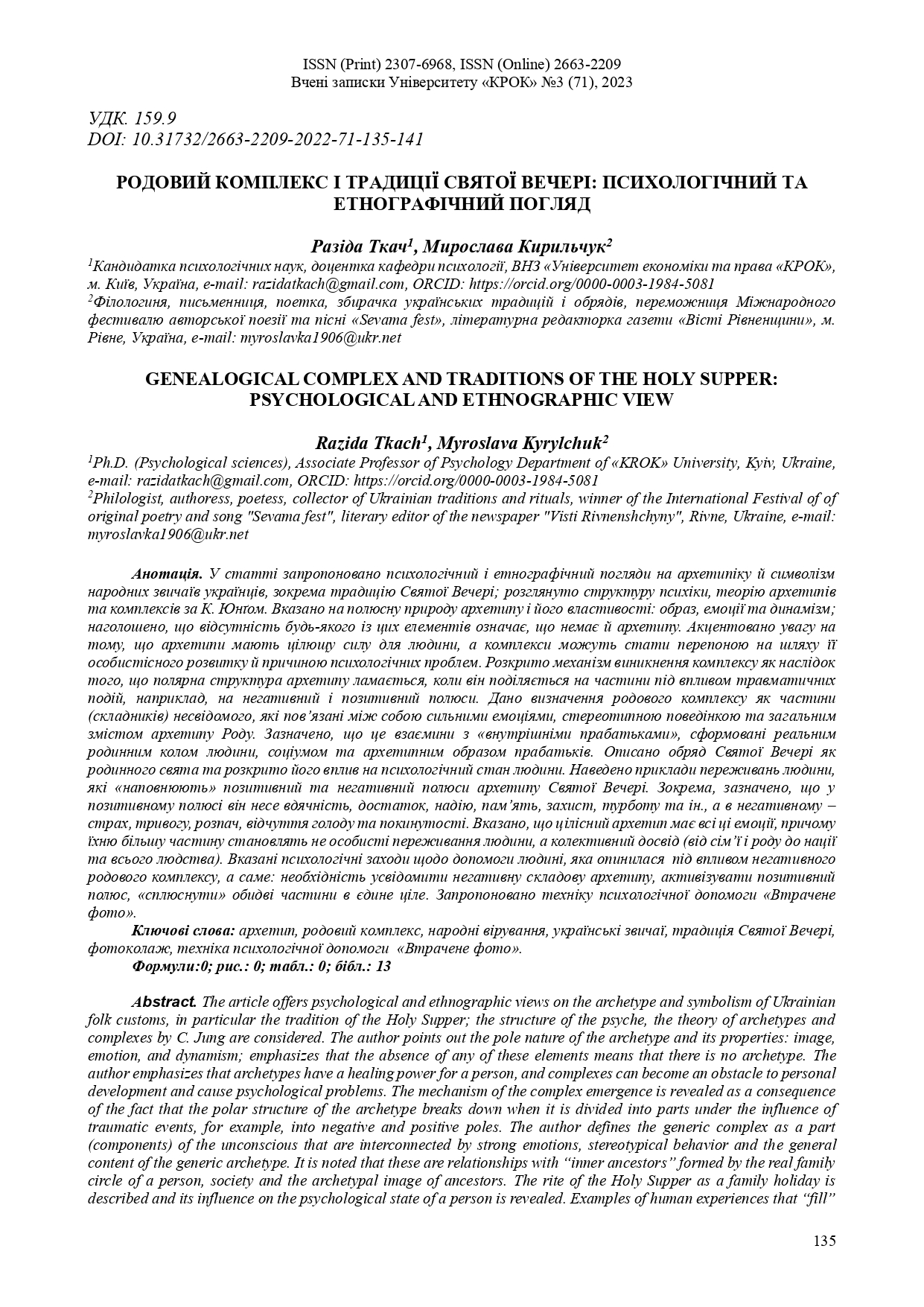GENEALOGICAL COMPLEX AND TRADITIONS OF THE HOLY SUPPER: PSYCHOLOGICAL AND ETHNOGRAPHIC VIEW
DOI:
https://doi.org/10.31732/2663-2209-2022-71-135-141Keywords:
archetype, ancestral complex, folk beliefs, Ukrainian customs, tradition of the Holy Supper, photo collage, technique of psychological assistance “The Lost Photo”Abstract
The article offers psychological and ethnographic views on the archetype and symbolism of Ukrainian folk customs, in particular the tradition of the Holy Supper; the structure of the psyche, the theory of archetypes and complexes by C. Jung are considered. The author points out the pole nature of the archetype and its properties: image, emotion, and dynamism; emphasizes that the absence of any of these elements means that there is no archetype. The author emphasizes that archetypes have a healing power for a person, and complexes can become an obstacle to personal development and cause psychological problems. The mechanism of the complex emergence is revealed as a consequence of the fact that the polar structure of the archetype breaks down when it is divided into parts under the influence of traumatic events, for example, into negative and positive poles. The author defines the generic complex as a part (components) of the unconscious that are interconnected by strong emotions, stereotypical behavior and the general content of the generic archetype. It is noted that these are relationships with “inner ancestors” formed by the real family circle of a person, society and the archetypal image of ancestors. The rite of the Holy Supper as a family holiday is described and its influence on the psychological state of a person is revealed. Examples of human experiences that “fill” the positive and negative poles of the archetype of the Holy Supper are given. In particular, it is noted that in the positive pole it carries gratitude, abundance, hope, memory, protection, care, etc., and in the negative pole it carries fear, anxiety, despair, hunger and abandonment. It is pointed out that the holistic archetype has all these emotions, and most of them are not personal experiences of a person, but collective experience (from family and clan to nation and all mankind). Psychological measures to help a person who is under the influence of a negative generic complex are indicated, namely: the need to realize the negative component of the archetype, activate the positive pole, and “flatten” both parts into a single whole. The technique of psychological assistance “The Lost Photo” is proposed.
Downloads
References
Юнґ, К. Г. (2008). Архетипи і колективне несвідоме. Львів: Астролябія.
Franz, Marie-Louise von (2012). Archetypische Dimensionen der Seele. Amazon Kindle.
Дідух, М. Л. (2015). Феномен етнічної індивідуації. Київ: Ніжин: Вид. Лисенко М. М.
Донченко, О. (2001). Архетипи соціального життя і політика (Глибинні регулятиви психологічного повсякдення) : моногр. Київ : Либідь.
Куєвда, В. (2007). Міфологічні джерела української етнокультурної моделі: психологічний аспект. Монографія. Донецьк: Український культурологічний центр, Донецьке відділення НТШ.
Польшина, О. Г. (2003). Психосемантичний підхід у дослідженні семантичних просторів деяких орнаментальних символів. Проблеми загальної та педагогічної психології. Збірник наукових праць Інституту психології ім. Г. С. Костюка АПН України, (V (7), с. 230-237.
Тиховська, О. М. (2011). Українська народна чарівна казка: психоаналітичний аспект. Ужгород: Ґражда.
Ткач, Р., Сербова, О. (2023) Використання кодів історичної пам’яті українців у терапевтичних метафорах. Вчені записки Університету «КРОК», (3(67), с.161–166.
Воропай, О. (1958). Звичаї нашого народу. Етнографічний нарис: Українське видавництво. Мюнхен.
Скуратівський, В.Т. (1995). Дідух : свята укр. Народу. Київ: Освіта.
Александрович, В. (1995). Українське малярство ХІІІ-ХV ст. Львів: Видано коштом Д-ра Стефанії Тершаковець-Бережницької та Д-ра Юрія Бережницького в пам'ять їх Родичів.
Ткач, Р. (2023). Юнґіанське подружнє консультування. Київ: Талком.
Ткач, Р., Сербова, О. та ін. (2021). Юнгіанське консультування: кол. моногр. К.: Талком.

Downloads
Published
How to Cite
Issue
Section
License

This work is licensed under a Creative Commons Attribution-NonCommercial 4.0 International License.

